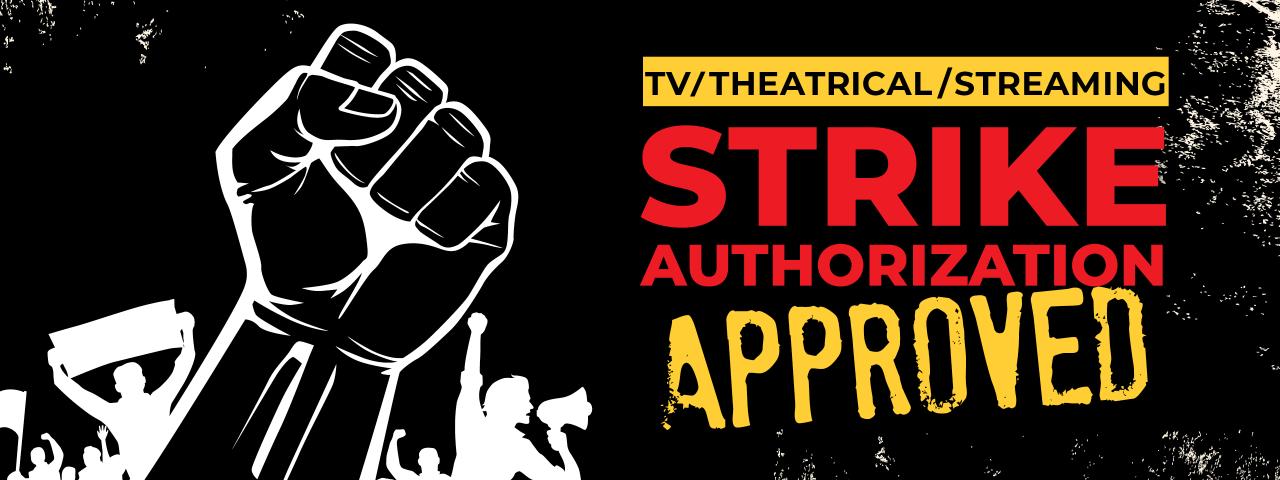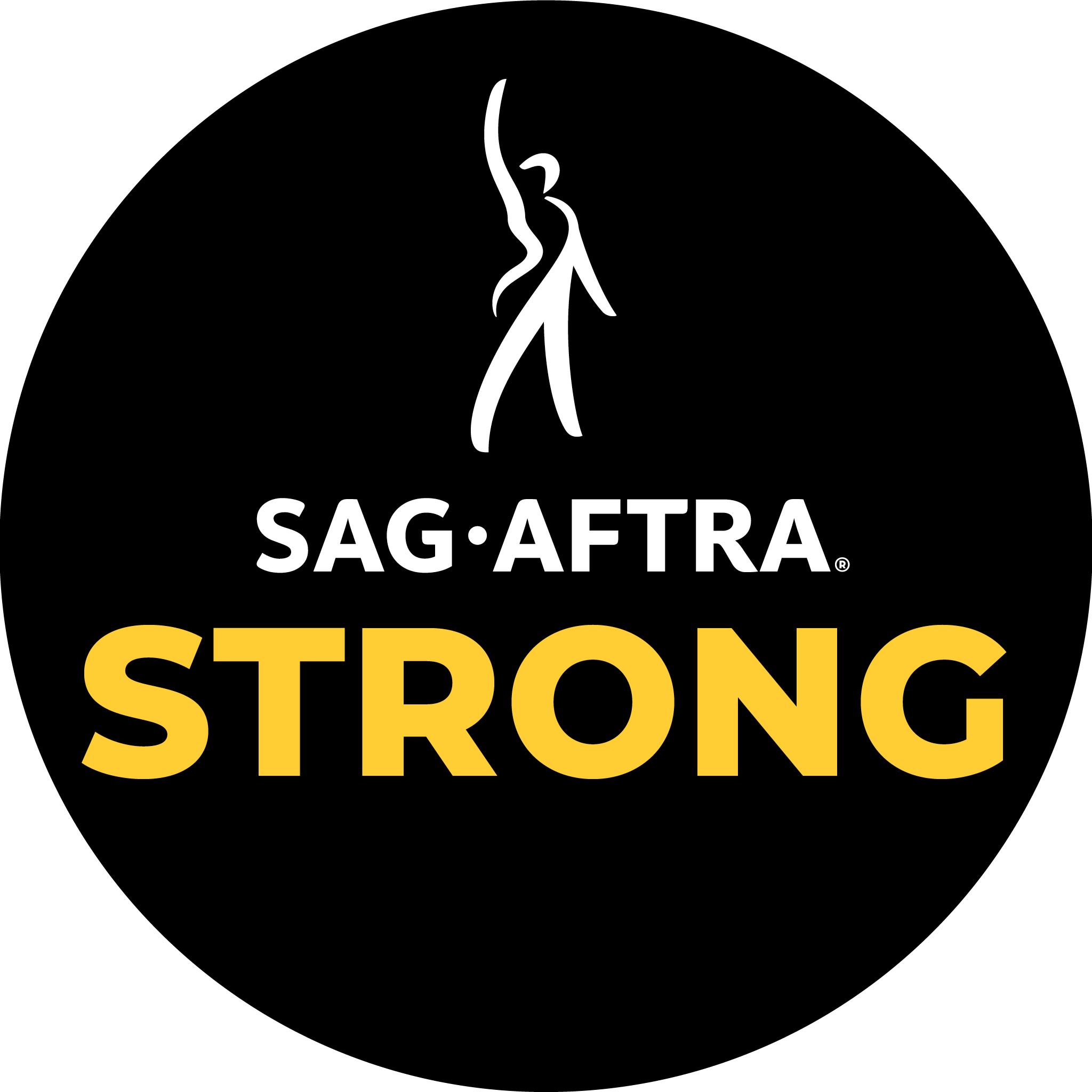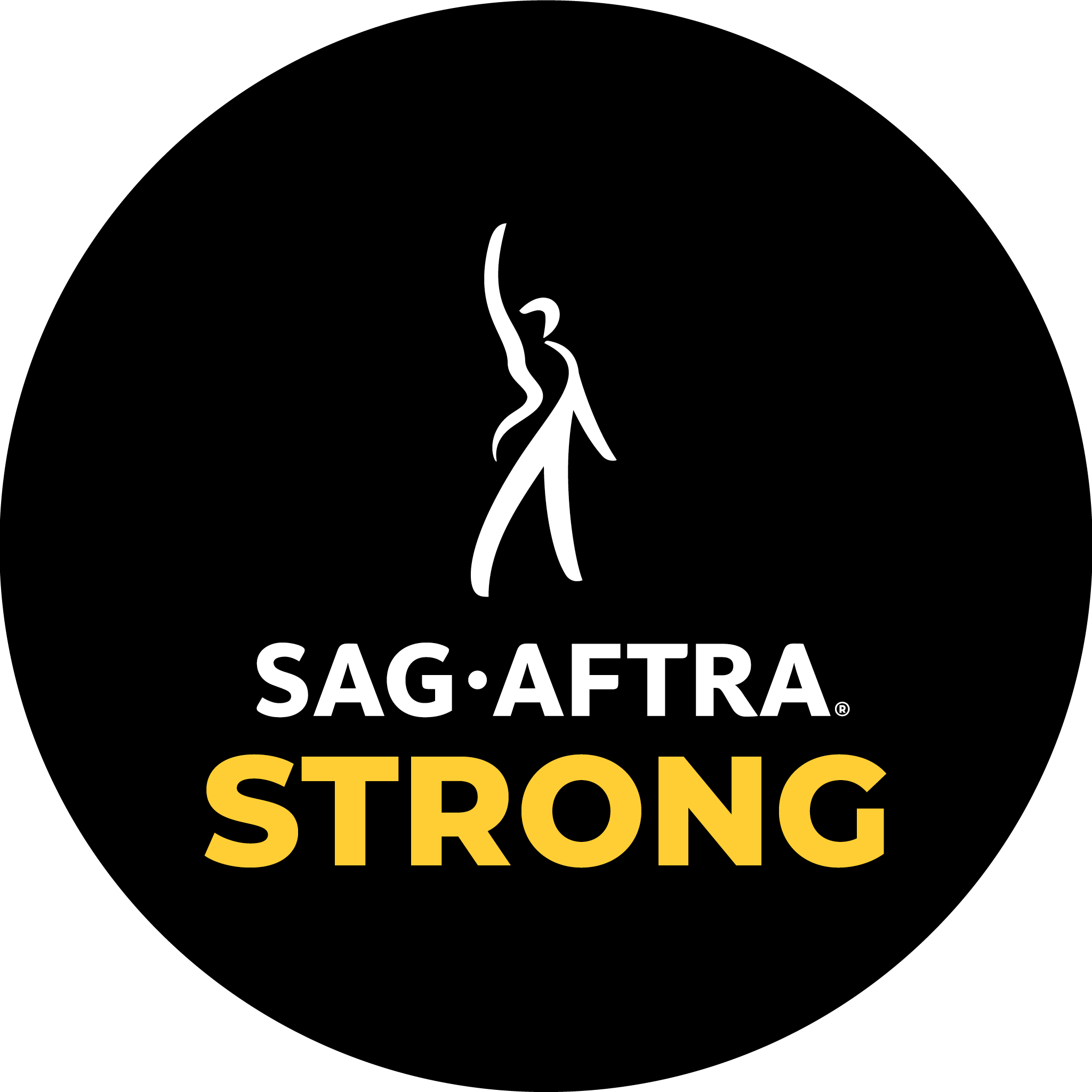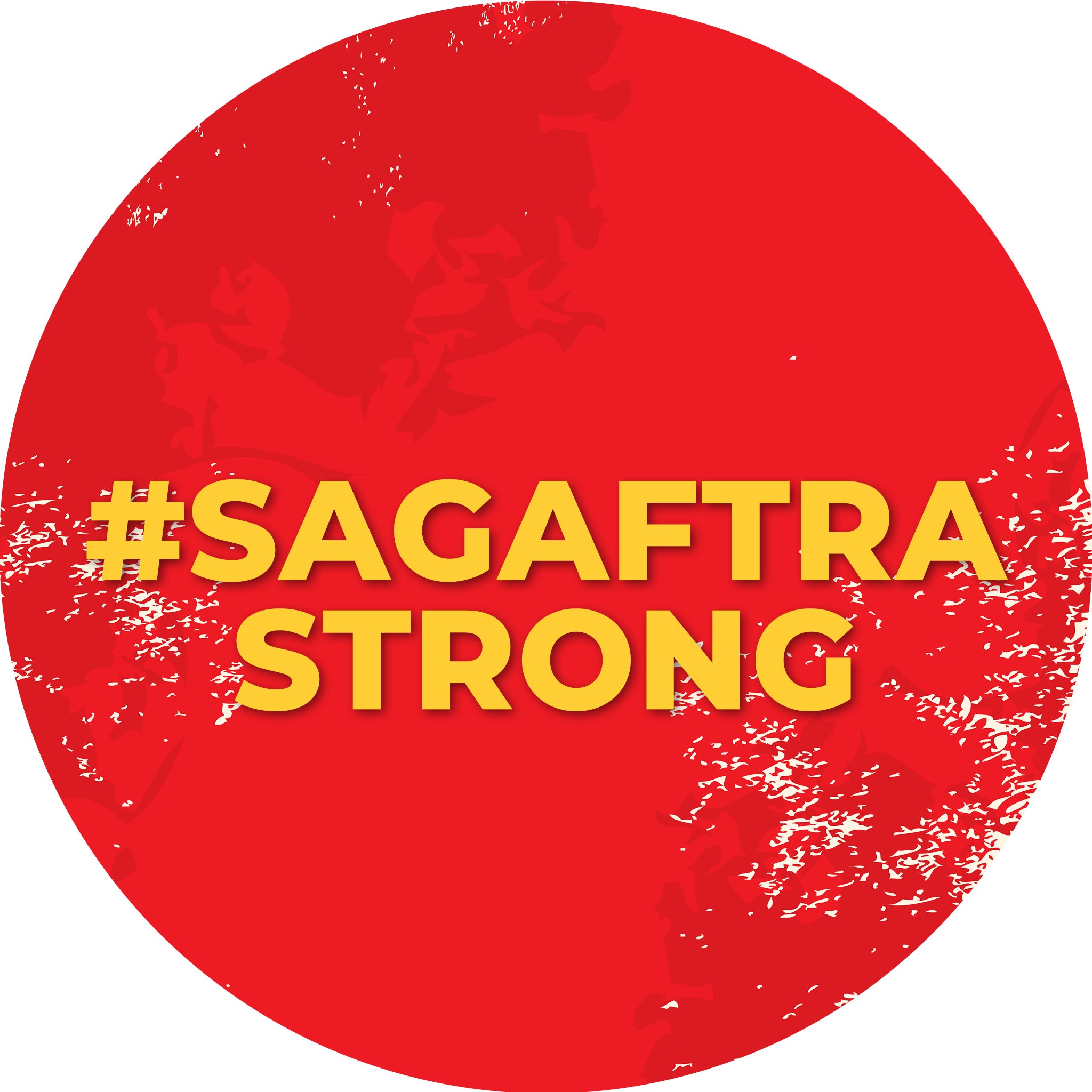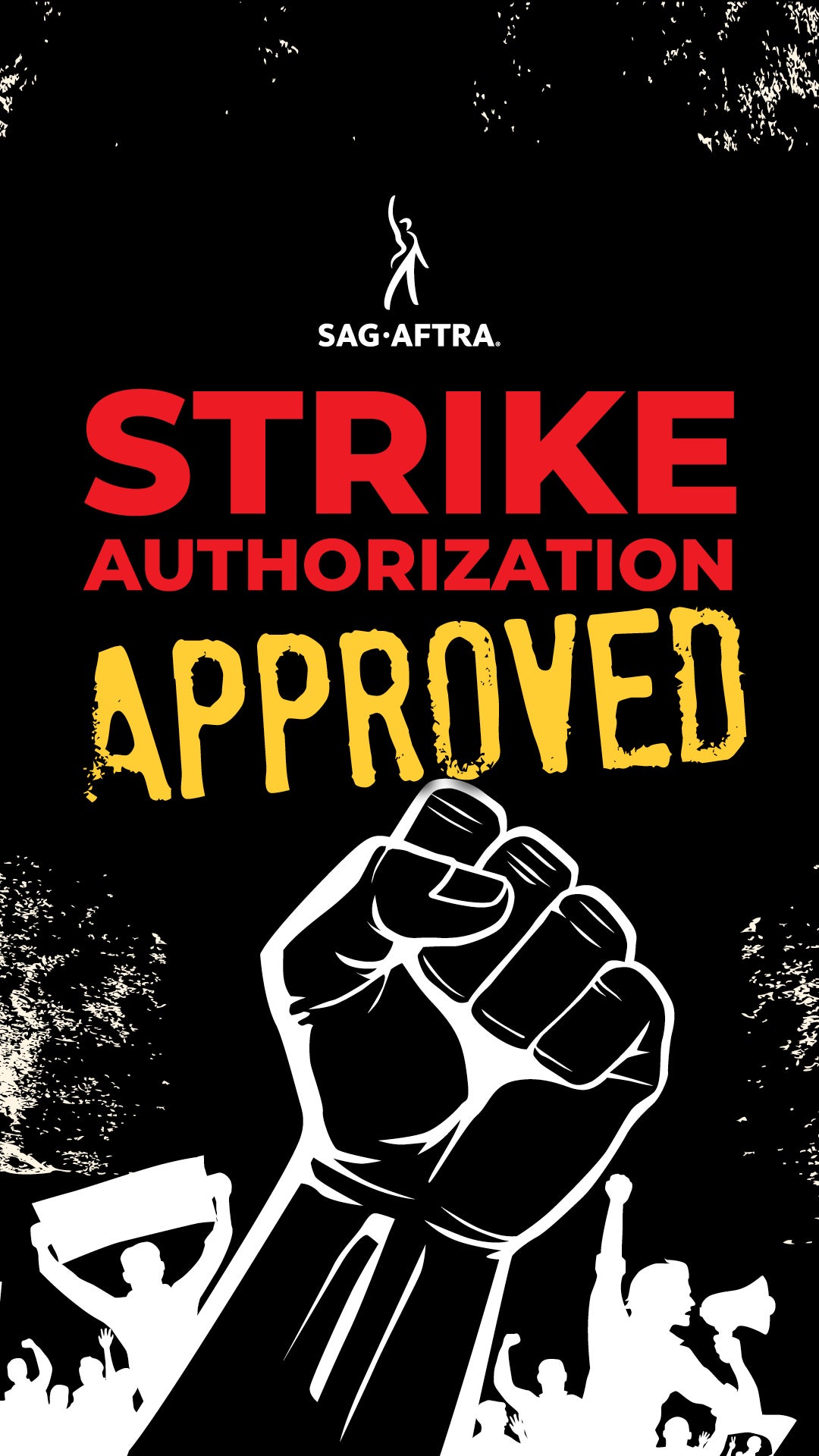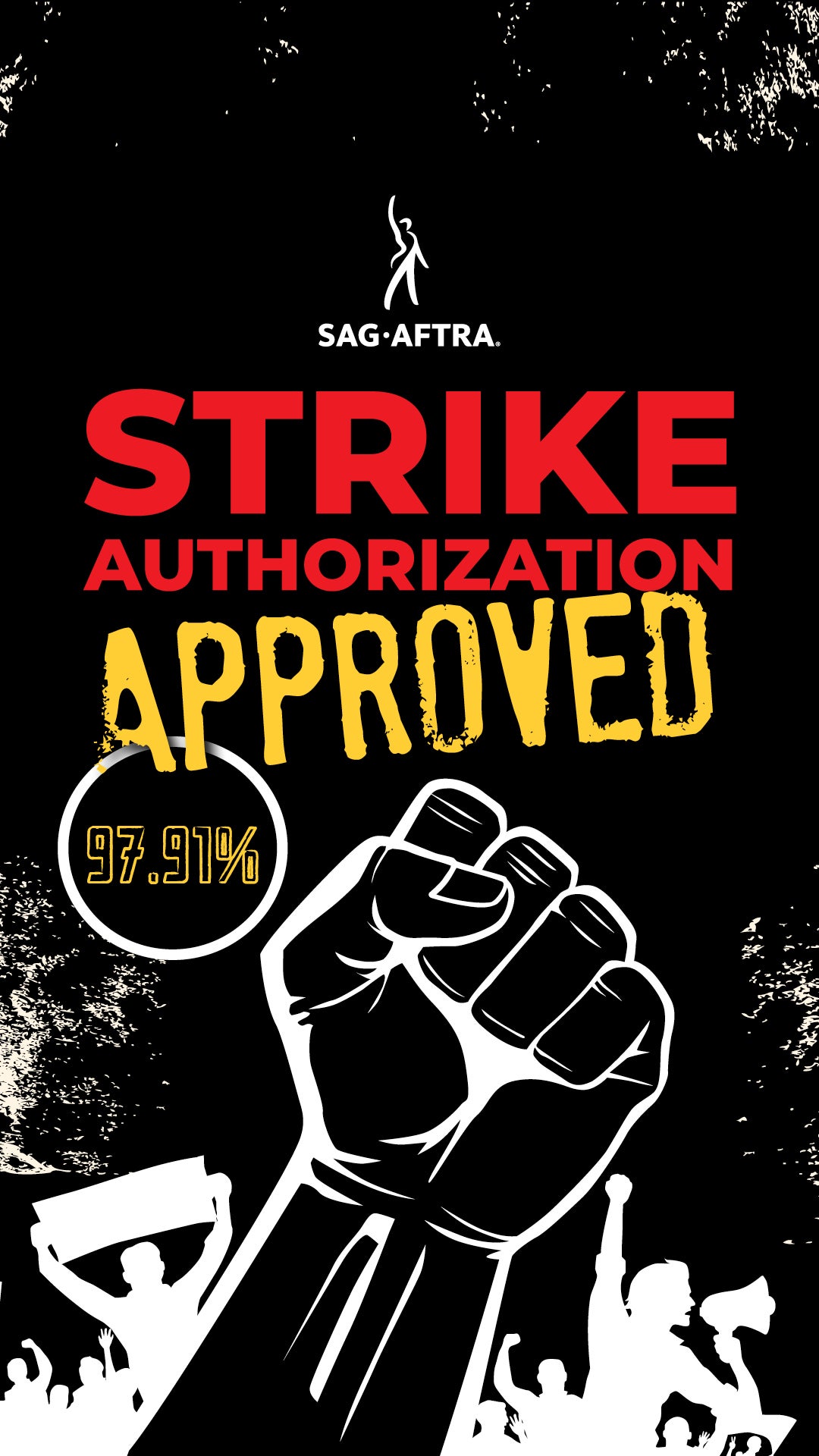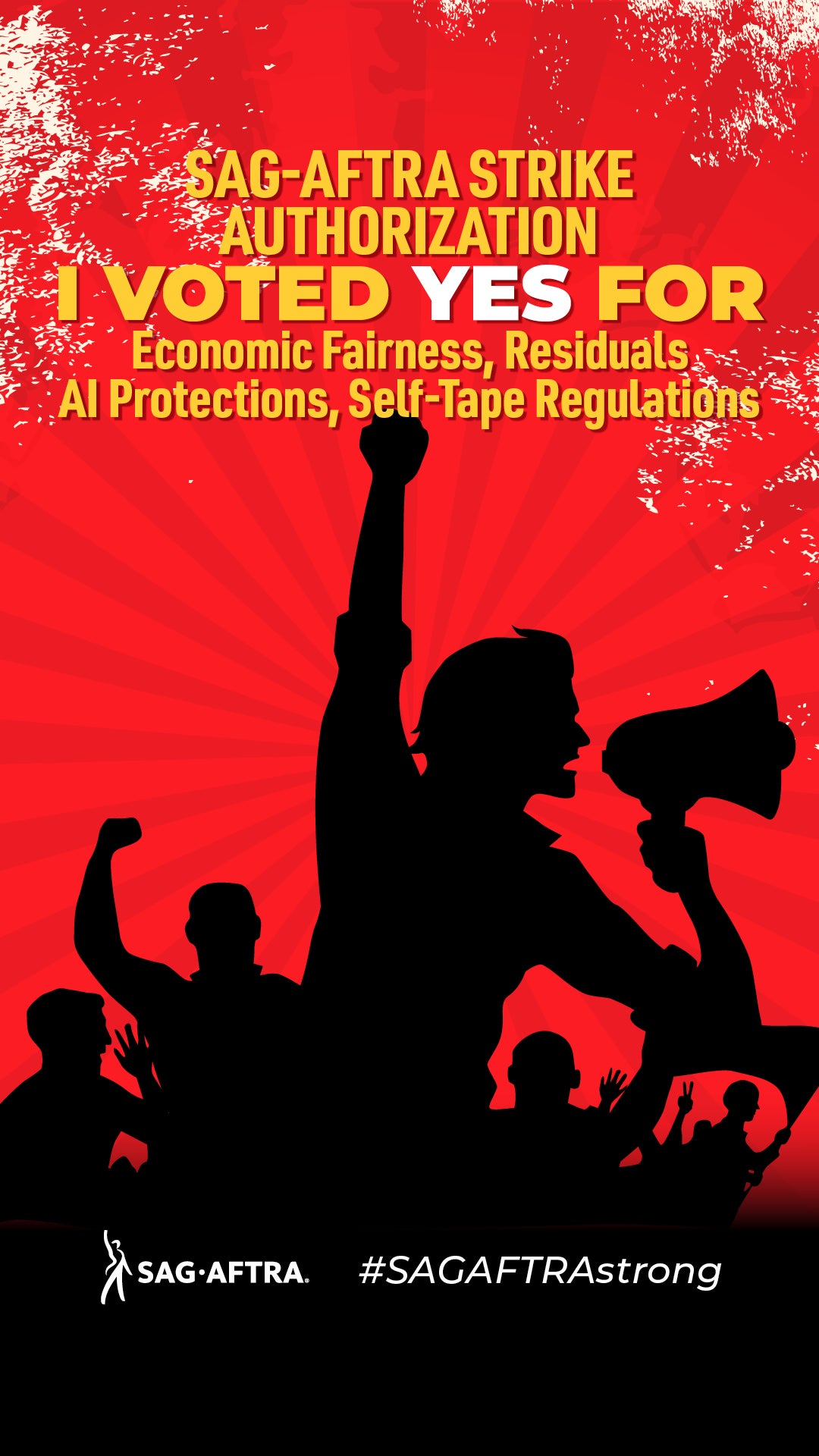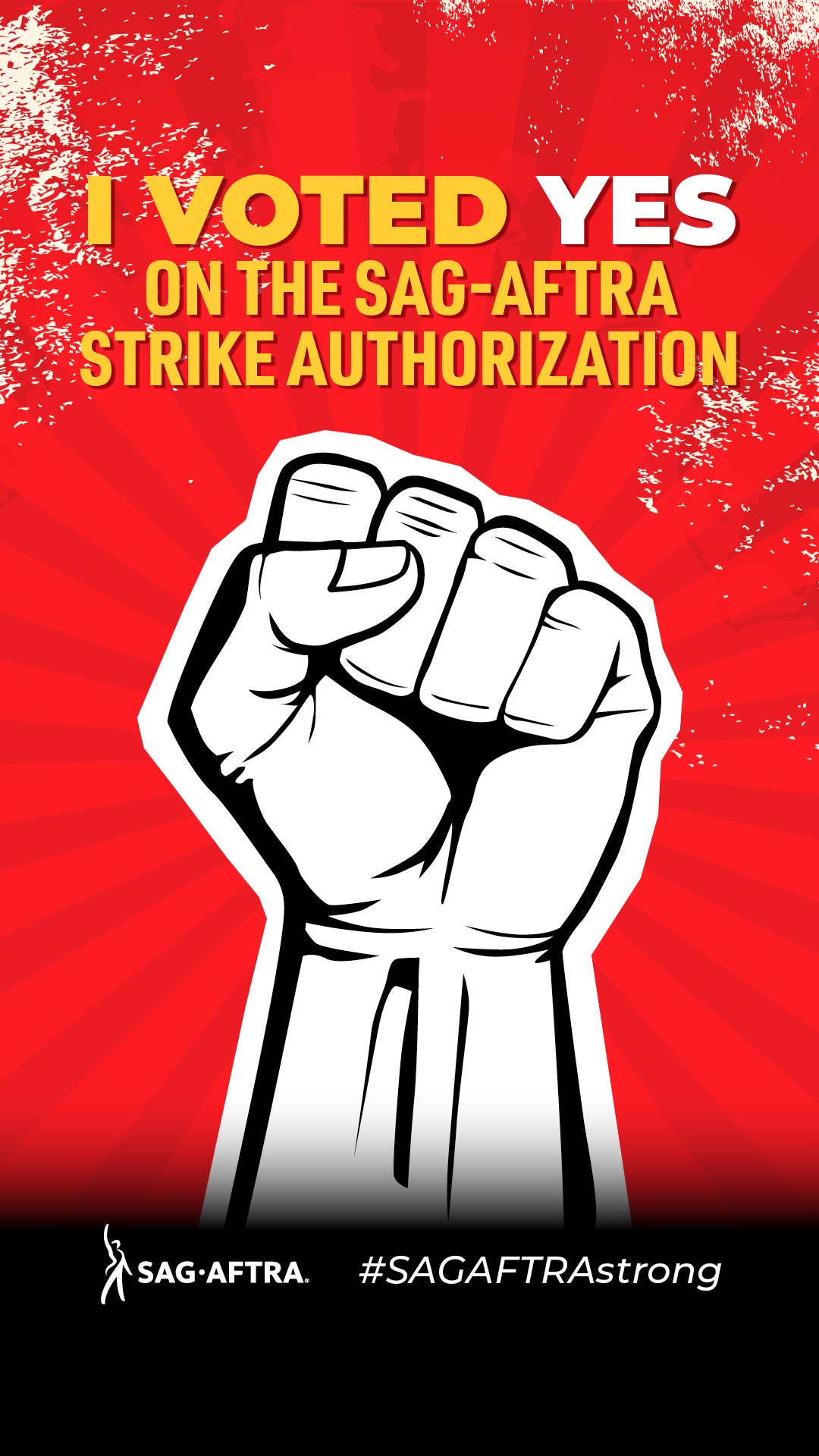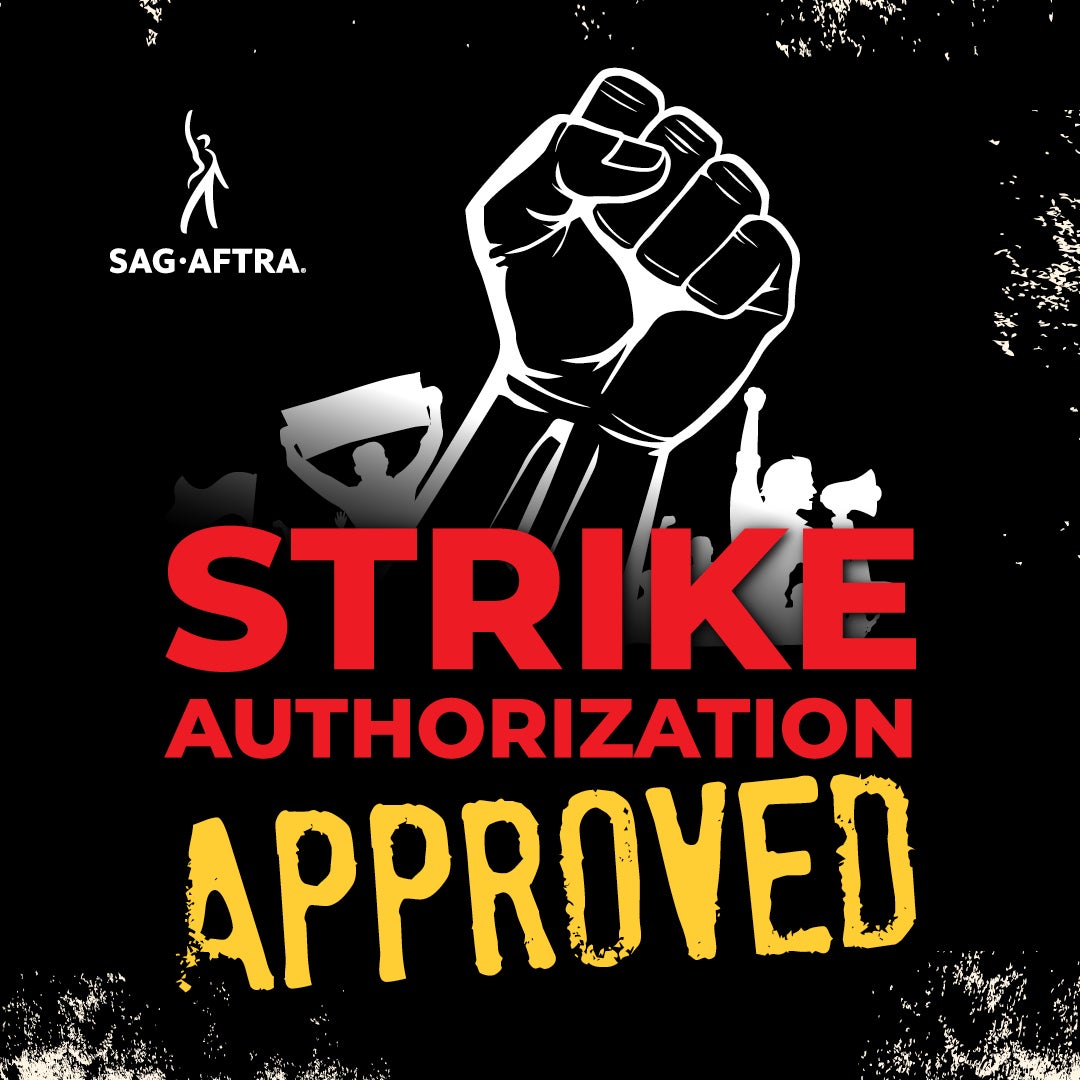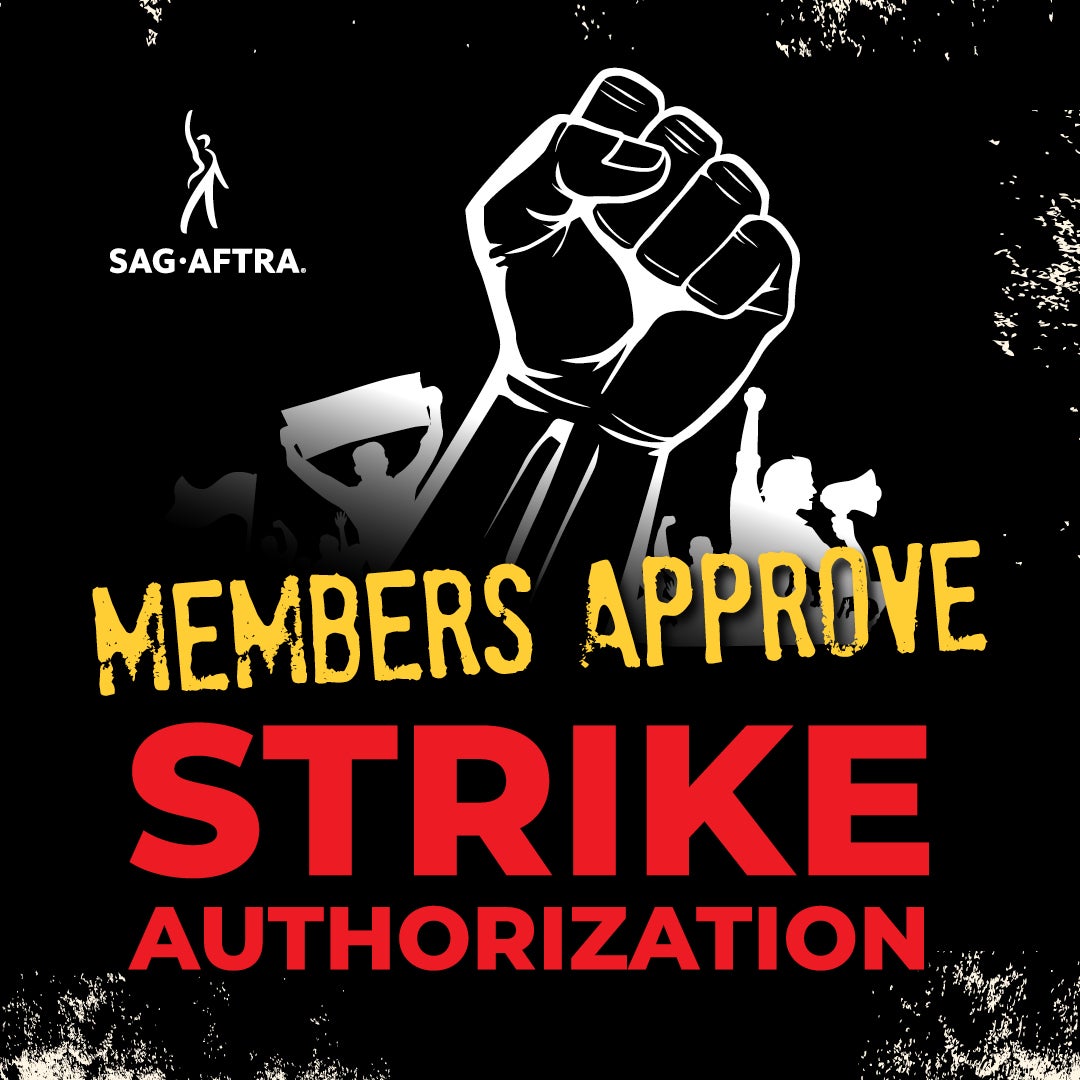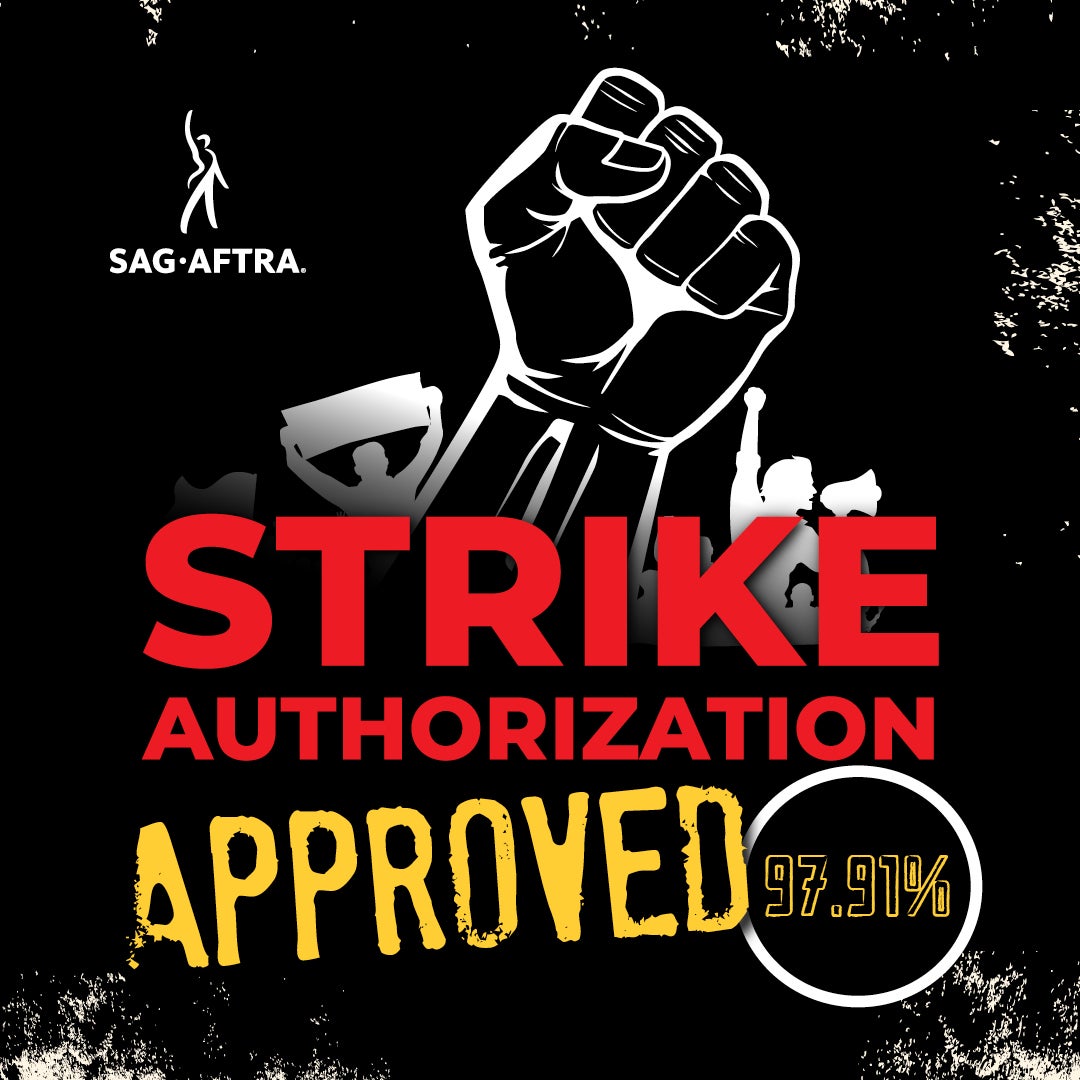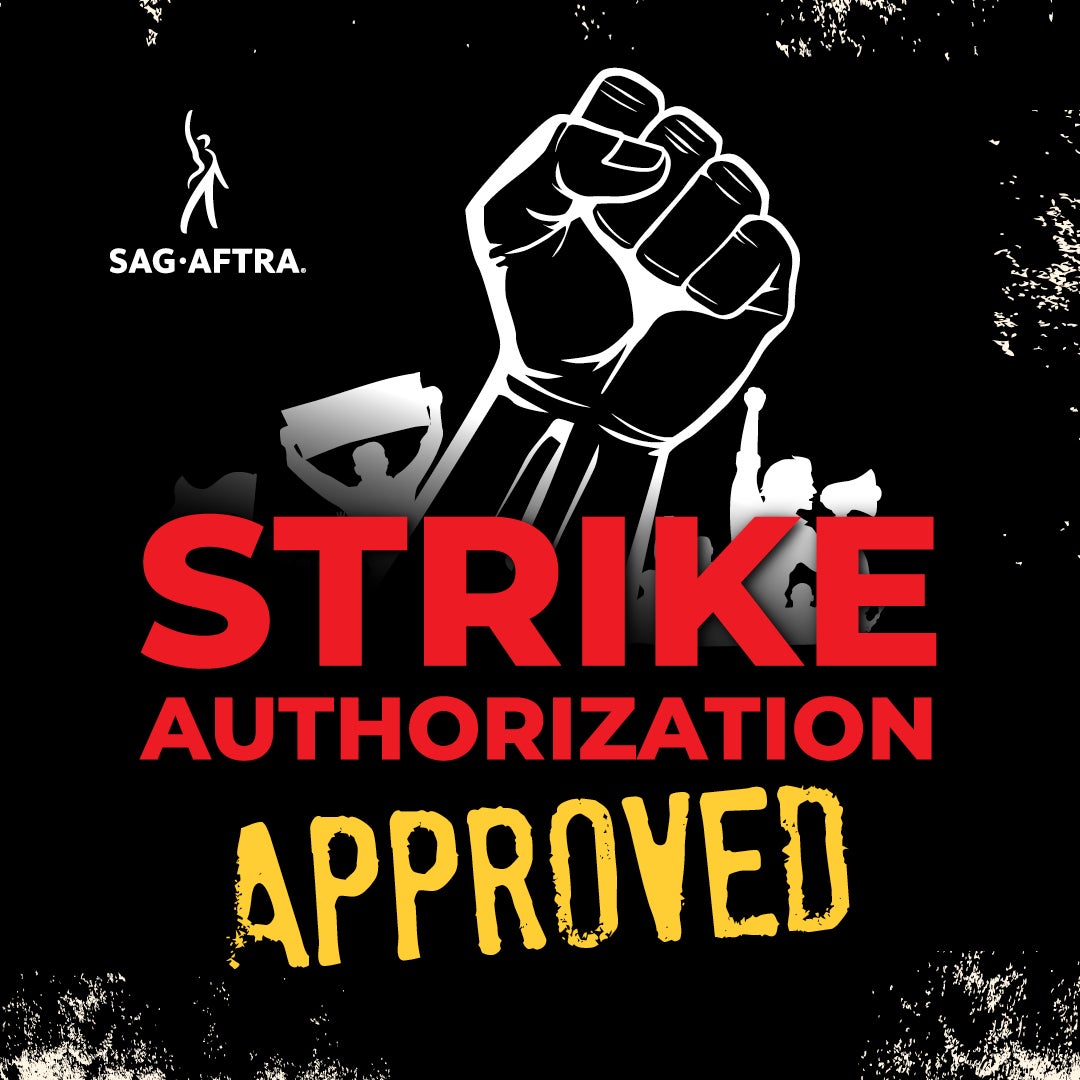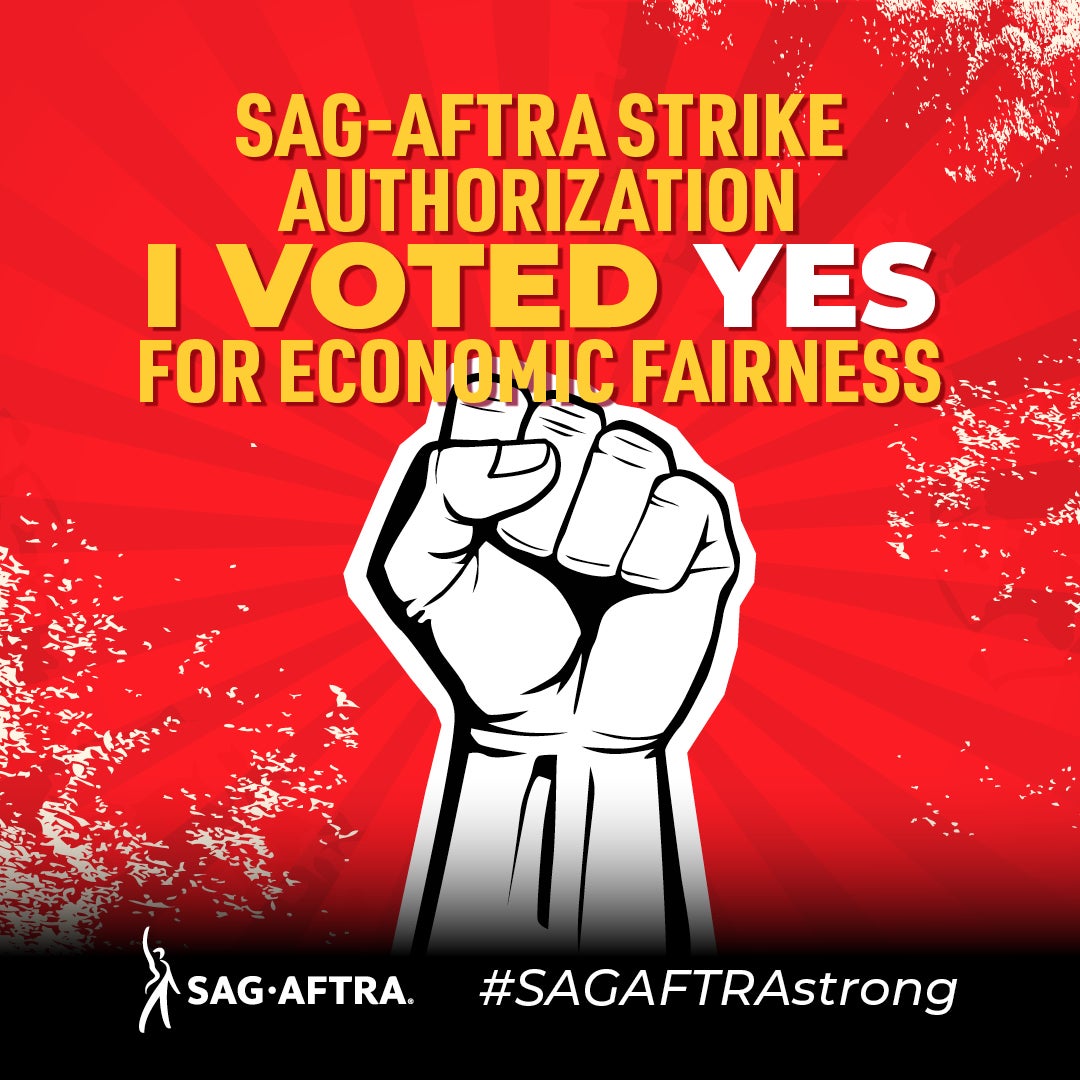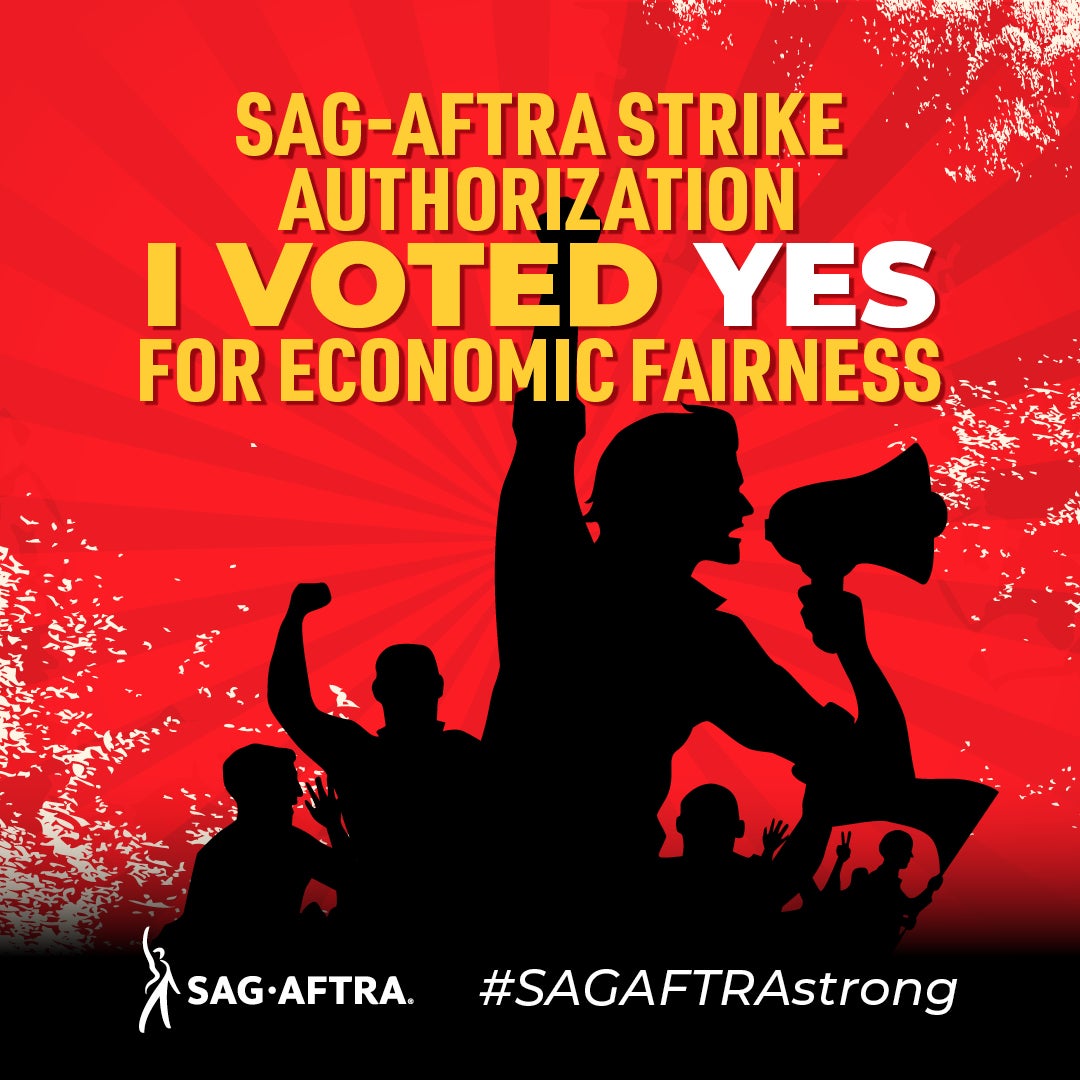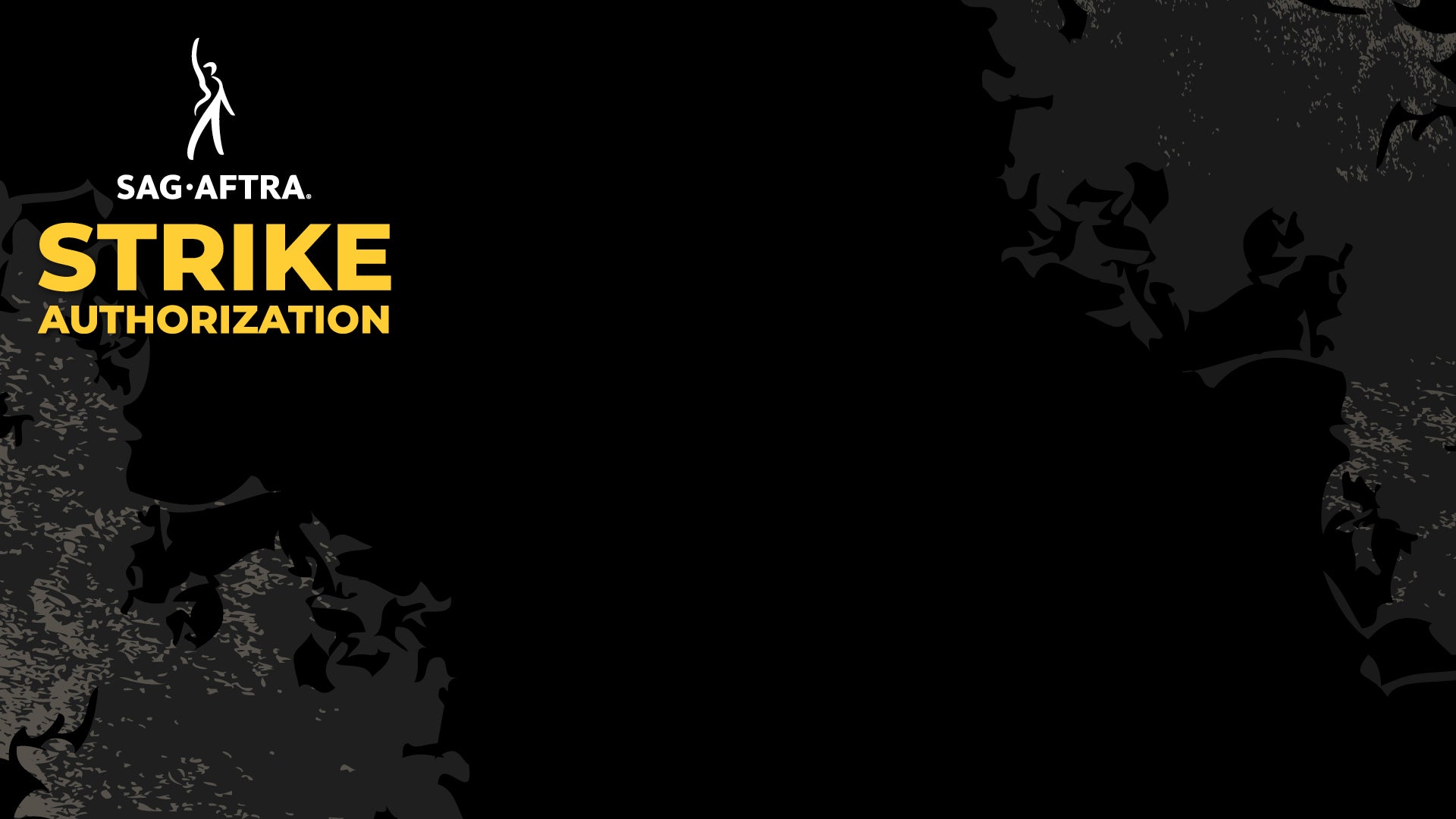Dear Member,
In a powerful show of solidarity, SAG-AFTRA members have voted 97.91% in favor of a strike authorization ahead of negotiations of the TV/Theatrical Contracts, with nearly 65,000 members casting ballots for a voting percentage of 47.69% of eligible voters.
The strike authorization does not mean the union is calling a strike. SAG-AFTRA begins negotiations on June 7 with the Alliance of Motion Picture and Television Producers. The affirmative vote on the authorization empowers the union’s National Board to initiate a strike if the AMPTP won’t reach a fair deal with the union. The current SAG-AFTRA TV/Theatrical Contracts expire at midnight on June 30, 2023. Click to read more
Strike Authorization Vote FAQs
Every three years, SAG-AFTRA enters negotiations with Alliance of Motion Picture & Television Producers (AMPTP) on the TV/Theatrical Agreement, which covers most of our members’ work in scripted film, television and new media. We are scheduled to start negotiations for the 2023 contract on June 7.
This FAQ provides a general overview of the negotiating process, as well as information about the strike authorization vote that was unanimously recommended by the National Board on May 17, 2023.
-
A strike authorization is a powerful tool that gives your negotiating committee added leverage at the bargaining table by demonstrating to the studios and streaming companies that SAG-AFTRA members support their committee and are willing to fight for a fair deal. It does not automatically mean there will be a strike.
If 75% or more of eligible members casting ballots vote YES, a strike authorization passes and gives your National Board the authority to call a strike after the contract expires. In the case of SAG-AFTRA’s TV/Theatrical Agreements, assuming a strike authorization is approved by members, that means the National Board can call a strike anytime after June 30, 2023.
-
The upcoming TV/Theatrical negotiations will determine whether our members working in film, television and streaming can continue earning a professional living doing the job they love. Compensation has been undercut by inflation and by a streaming ecosystem through which producers pay less residual income than traditional exhibition models. Unregulated use of artificial intelligence threatens the very voices and likenesses that form the basis of professional acting careers. The benefit plans that members rely upon for health care and a dignified retirement are under stress. And the shift to burdensome and unreasonably demanding self-taped auditions means that our members are working harder than ever, forced to take on audition costs that have always been the responsibility of casting and production. Without transformative change in the TV/Theatrical contracts, it will soon be unsustainable to pursue a career working under these conditions.
The time for change is now and we must be prepared to fight if management will not address our concerns. To maximize our leverage, we are asking members to vote to authorize a TV/Theatrical strike should discussions at the bargaining table prove unproductive.
A strike authorization vote doesn’t guarantee a strike will occur; rather, it’s a tool we can use to help our negotiating team secure the best deal possible.
-
With a YES vote in hand, the National Board will have the ability to declare a strike if bargaining fails to produce a deal our members will accept. A YES vote is a strong show of solidarity with your fellow working actors on the TV/Theatrical negotiating committee, giving them the backing they can leverage to reach a deal and fight for the contract we deserve.
-
A no vote tells management that they do not have to make a fair deal in order to keep our members working. Without the threat of a work stoppage, management has little incentive to change archaic contract provisions that advantage them and exploit our members.
-
The vote requires at least 75% of eligible members casting ballots to vote YES to authorize the National Board or its designee to declare a strike once SAG-AFTRA’s contract expires. While 75% is the required threshold, we want as close to a 100% YES vote as possible. This shows management we are united in our resolve for a fair contract.
-
No. Instead, the strike authorization vote permits the National Board to declare a strike if the studios and streaming companies fail to protect and uphold the basic working conditions of our members — the professional performers who make this one of the most successful industries in the world. Your negotiating committee and National Board will do everything they can to reach an agreement without a strike, and the leverage of a successful strike authorization vote will strengthen us to push for the best deal possible.
-
SAG-AFTRA negotiates with the major studios and streamers, including Amazon/MGM, Apple, NBCUniversal, Disney/ABC/Fox, Netflix, Paramount/CBS, Sony and Warner Brothers, who are represented at the bargaining table by the Alliance of Motion Picture and Television Producers (AMPTP).
-
Members are the driving force during negotiations. SAG-AFTRA President Fran Drescher chairs the TV/Theatrical Negotiating Committee, comprised of a diverse and inclusive group of members from around the country representing the various work categories covered by the TV/Theatrical agreements. The committee advises and works in partnership with Chief Negotiator Duncan Crabtree-Ireland and a staff team of contract experts and seasoned negotiators.
-
Key issues include economic fairness, residuals, regulating the use of artificial intelligence and alleviating the burdens of the industry-wide shift to self-taping.
- Economic Fairness: Outdated contract terms, coupled with the evolution of the media business, including shorter season orders and longer hiatuses between seasons makes it increasingly difficult for our members to achieve and maintain a middle class lifestyle working as a performer. In sharp contrast to the diminishing compensation paid to our members, the studios are posting immense profits with a bullish outlook as demonstrated by lavish corporate executive compensation.
- SAG-AFTRA is committed to ensuring our members are able to make a living performing in scripted dramatic live action entertainment. This means ensuring increased compensation when our members work, shoring up the funding of our Health, Retirement, and Pension Plans, and providing our members a meaningful share of the economic value created by their performances.
- Residuals: Residuals supplement session payments and are an integral element of any performer’s compensation. While new business models mean that more and more SAG-AFTRA content is monetized around the globe, residuals payments are failing to reflect the economic value of this exhibition. SAG-AFTRA is committed to ensuring residual payments both reflect the economic value of our members’ contribution, and serve as a meaningful source of performer earnings.
- AI: Technology has advanced at a rapid pace. Artificial intelligence has already proven to be a real and immediate threat to the work of our members and can mimic members’ voices, likenesses and performances. We must get agreement around acceptable uses, bargain protections against misuse, and ensure consent and fair compensation for the use of your work to train AI systems and create new performances.
- In their public statements and policy work, the companies have not shown a desire to take our members’ basic rights to our own voices and likenesses seriously.
- Self-Tapes: Self-taped auditions are unregulated and out of control: too many pages, too little time and unreasonable requirements have made self-taping auditions a massive, daily, uncompensated burden on the lives of performers.
- Reasonable rules and limitations, and access to other casting formats, are sorely needed to ensure fair access to work opportunities and protect performers against exploitation.
- Many other important issues, including those specific to particular careers and categories, will be on the table as well.
-
Negotiations open with proposals from both sides. SAG-AFTRA brings forth a package of proposals that addresses the concerns of members and, throughout the negotiations, fights for you and the issues you told us were important. The AMPTP will often make proposals designed to cut costs at member expense in order to pad corporate profits and fund lavish executive compensation. Away from the bargaining table, the negotiating committee deliberates on bargaining decisions and debates tactics and strategies. Proposals may then be amended, countered, or dropped, by either side until an agreement is reached or negotiations reach a stalemate.
-
SAG-AFTRA leadership (National Board) must wait until the current TV/Theatrical Agreements expire on June 30, 2023, and must have a successful strike authorization vote before a strike can be called. If a strike is called, members will withhold their labor and not perform any services for struck companies. SAG-AFTRA members will then engage in collective actions such as picketing to put pressure on the AMPTP.
-
Yes. There will be no change in the residuals owed to you for existing work product, and your residuals payments will continue to be sent to you.
-
To be clear, this referendum is to authorize a strike, not declare one. The result of a “Yes” vote is not a strike, it is to authorize the National Board to declare a strike if the AMPTP will not adequately address our members’ needs in bargaining. If it becomes necessary for the National Board to declare a strike, the strike order will define the scope of the work that is struck.
Any work under a contract that incorporates the terms of the Codified Basic Agreement or Television Agreement–including, but not limited to, the Ultra Low Budget Project Agreement, Moderate Low Budget Project Agreement, Low Budget Theatrical Agreement and Special New Media Agreements–can be struck, including any productions that began prior to the date of the strike. Independently-produced content at the lowest budget levels, however, including work done under SAG-AFTRA’s “Micro Budget Agreement,” “Short Project Agreement” and student film agreements, likely would not be struck.
With respect to non-AMPTP, independently-produced content that comes within the scope of a strike order, SAG-AFTRA anticipates offering an “Interim Agreement” that would allow such productions to continue working during a strike provided that the producer agrees to abide by the terms that SAG-AFTRA is seeking from the AMPTP. In that case, the “Interim Agreement” would largely be conformed to the AMPTP agreement on a going-forward basis once the membership ratifies successor agreements with the AMPTP.
The foregoing is subject to the discretion of the National Board and the Negotiating Committee, which must retain the ability to adjust strike rules as necessary to achieve a successful result.
-
We do not anticipate that dubbing work will be within the scope of the strike order in the event that a strike becomes necessary. As a reminder, a “Yes” vote does not result in a strike, it authorizes the National Board to declare a strike if the AMPTP refuses to adequately address our members’ needs in bargaining. The National Board and Negotiating Committee, however, must retain the ability to adjust strike rules as necessary to achieve a successful result.
-
Yes, we anticipate that a strike order will include work on overseas productions under the Codified Basic Agreement and Television Agreement, including work done under a GR-1 memorandum of agreement. Once again, however, a “Yes” vote does not result in a strike, it authorizes the National Board to declare a strike if the AMPTP refuses to adequately address our members’ needs in bargaining.
With respect to non-AMPTP, independently-produced content that comes within the scope of a strike order, SAG-AFTRA anticipates offering an “Interim Agreement” that would allow such productions to continue working during a strike provided that the producer agrees to abide by the terms that SAG-AFTRA is seeking from the AMPTP. In that case, the “Interim Agreement” would largely be conformed to the AMPTP agreement on a going-forward basis once the membership ratifies successor agreements with the AMPTP.
The foregoing is subject to the discretion of the National Board and the Negotiating Committee, which must retain the ability to adjust strike rules as necessary to achieve a successful result.
News & Broadcast FAQs
-
NO. Broadcast members work under individual station or network contracts. The terms and conditions of your employment are NOT affected by this Strike Authorization vote.
-
All active members of SAG-AFTRA in good standing whose November 2022 and/or May 2023 dues have been paid by April 18, 2023, including news and broadcast members.
-
SAG-AFTRA has sent a strike authorization for the 2023 TV/Theatrical Codified Basic Agreement in advance of entering into bargaining with the Alliance of Motion Picture and Television Producers on June 7, 2023. A strike authorization is a powerful tool that gives the Negotiating Committee added leverage at the bargaining table.
- It does not automatically mean there will be a strike. Rather, it gives the National Board the authority to call a strike if bargaining fails to produce a deal our members will accept. No strike can occur prior to the expiration of the contract on June 30, 2023.
- The existence of a strike authorization vote does not change anything in your broadcast radio or TV contracts and obligations.
-
SAG-AFTRA is asking any member who is eligible to vote YES to authorize the National Board to declare a strike if necessary. The vote requires at least 75% of eligible members casting ballots to vote YES and we want as close to a 100% YES vote as possible to show management we are united in our resolve for a fair contract.
-
Yes, you can choose whether or not to participate in the strike authorization vote. If you feel that you have a journalistic conflict with casting a ballot, you may choose not to cast a ballot. Please note that your vote is by secret ballot.
-
News & Broadcast work would NOT be covered by a TV/Theatrical strike. Only productions that are covered by the TV/Theatrical Codified Basic Agreement and Television Agreement will be struck. Scripted dramatic live action entertainment production that is covered by the SAG-AFTRA TV/Theatrical Contracts would be considered struck work and you should not participate.
-
No, walking a picket line is not mandatory, even for those whose work will be directly impacted by a strike. It is, however, an important way of showing solidarity with workers who are on strike.
-
If you want to participate in a picket line at your place of employment or if you have specific concerns about journalistic conflicts or employer policies on this subject, please contact your SAG-AFTRA local staff person before participating in any picket.
-
If you work for an employer that is not being struck, but in the same location as a picket, you may be able to use what is called a “neutral gate” to enter and exit the workplace. Neutral gates must be clearly marked and are available for the other companies who are not being struck and have no connection to the labor dispute. However, neutral gates are NOT always available.
A "reserve gate" is set up exclusively for the struck company to use. Picketers can only picket outside of the reserve gate. A reserve gate must be clearly marked so that anyone from the street or sidewalk can see that this entrance is reserved exclusively for those working for or visiting the struck company.
In addition, for our broadcast and radio members working in locations where there are picket lines, SAG-AFTRA will facilitate providing you with placards you can place in your car windshield that show you are working under a SAG-AFTRA news or broadcast agreement.
Email strike.authorization@sagaftra.org if you have more questions.
Shareable Graphics
Profile Photos
Stories
Social Media Graphics
Zoom Background

